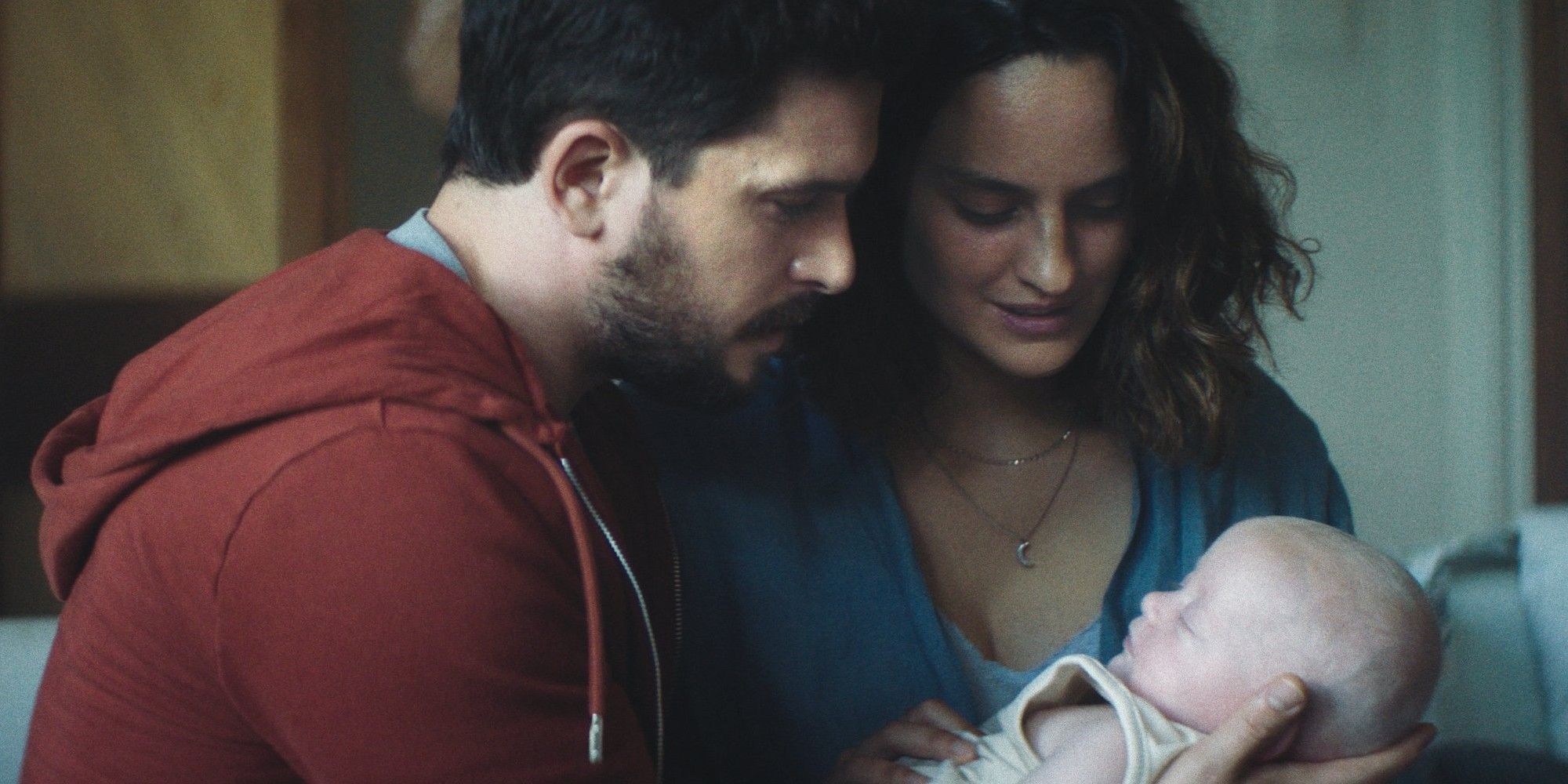Motherhood can be hell. That’s what writer-director Bess Wohl’s new feature, Baby Ruby, presents as its hypothesis. It isn’t the first movie to do so, and it surely will not be the last. Recent years have seen the conversation surrounding motherhood change to acknowledge its difficulties more and more. Baby Ruby applies a horror slant to the concept and is filled to the brim with compelling, timely ideas. Unfortunately, it never stays in place long enough to see any of those ideas through. Baby Ruby shows plenty of initial promise, but its refusal to follow through on threads and its reliance on basic scares leaves it feeling hollow.
Soon-to-be mother Jo (Noémie Merlant) is first seen painstakingly cutting out the letters for a banner for the baby shower she is throwing for herself. Jo is the hardworking boss of a successful lifestyle blog and, alongside her supportive husband Spencer (Kit Harington), seems to have the perfect life. However, it isn’t long after the happy couple welcomes the titular baby Ruby that unease sets in. As Ruby cries at the top of her lungs at all hours, Jo is gradually worn down, torn between her deep love for her daughter and her increasing fear that something isn’t quite right. As the lines between reality and nightmare begin to blur, Jo soon wonders who is the real danger: Ruby, the people around them, or herself.
Wohl stages the initial transition from perfection to terror quite well. As she wrote in her director’s statement, Baby Ruby was born out of her own experience with motherhood, which involved Wohl mourning the person she was before her child was born. In many ways, Jo’s story reflects that, and the drastic contrast between Baby Ruby‘s opening and the post-birth world highlights the idea that they are actually two different lives. Wohl doesn’t make the birth and its initial aftermath too graphic, but the amount of blood present on Jo leaves a sharp impression. As she and Spencer settle Ruby in at home, Ruby’s shrill cries echo throughout their home and in the viewers’ ears, effectively rattling the audience just as much as it does Jo. The editing team — JC Bond, Jin Lee, and Arielle Sherman — employ some neat visual tricks to emphasize the monotony of Jo pacing with a sobbing Ruby, desperately trying to soothe her to no avail.
However, though Baby Ruby sets itself up to be a sharp critique of motherhood and the rosy, unrealistic narrative that often surrounds it, it doesn’t quite hit its mark. Wohl brings up a myriad of interesting ideas, such as America’s poor childcare programs and how social media can distort one’s perception of a mother who has everything together. Wohl touches upon each of these concepts through casual lines of dialogue and moments with supporting characters, such as Spencer’s mother Doris (Jayne Atkinson) and Jo’s new friend Shelly (Meredith Hagner). With Jo careening from one conspiracy theory to another, though, none of these ideas stick, leaving Baby Ruby with surface-level social commentary. This would be okay if the film succeeded as purely a horror movie, but those elements fall flat too. Though Wohl sprinkles in several striking jump scares, more than a few are well-telegraphed beforehand, and others feel constructed with minimal effort. Jo’s slipping grasp on reality is demonstrated through moments that inch toward the paranormal, such as a brief scene where Jo’s shadow splits off from her and walks away. These don’t leave the impact they’re supposed to, save for a subtle instance with Jo and her reflection, they all feel too heavy-handed.
Merlant, best known for her roles in Portrait of a Lady on Fire and current Oscar nominee Tár, rises to the occasion with a gripping performance. She plays Jo’s increasing paranoia with breathless abandon, and even if the viewer might have a sense of what’s really going on, Merlant sells the idea that there truly are darker forces at play. Game of Thrones alum Harington doesn’t have as much of a substantial character to play, though this is by design and isn’t a shortcoming of the script. If there is a standout among the supporting cast, it is Hagner, who gives Shelly the right amount of warmth and unease, helping play into Jo’s growing suspicions. Ultimately, though, Baby Ruby is Merlant’s show, pushing her into difficult positions that emphasize her strength as a performer.
A horror movie examining the stress and trauma of a postpartum experience is an excellent idea, and Wohl’s personal touch certainly enlivens Baby Ruby. In the end, though, it sits more as a missed opportunity than a feature that really examines its themes thoughtfully. Jo’s story will no doubt resonate for many, and for that reason, it can be argued this movie is a worthwhile endeavor. One just wishes it opted to go deeper into its exploration of motherhood and the scares it provides; it could’ve left a far greater impact.
Baby Ruby released in theaters and on demand February 3. It is 93 minutes long and is unrated.


